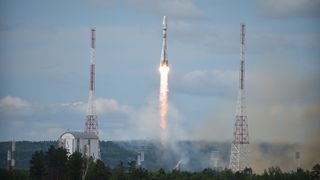Russia launches possible missile-tracking satellite amid continuing threats
The country has been threatening to act against U.S. commercial satellites looking at Ukraine, which Russia invaded in February.

The Russians sent a possible missile-detection satellite to space Wednesday (Nov. 2) as the country ramps up its rhetoric about attacking U.S. satellites over Ukraine.
A Soyuz-2.1b medium-class rocket launched with the satellite, whose purpose is not officially disclosed, at 1:48 a.m. EDT (0648 GMT or 9:48 a.m. Moscow time), according to Reuters, who cited Russian news reports pointing to a ministry statement. The launch took place from Plesetsk Cosmodrome in northern Russia.
"Combat crews of the space forces ... launched the Soyuz-2.1b medium-class carrier rocket with a spacecraft, in the interests of the Russian Defense Ministry," read a Russian-language report from FederalPress.ru, one of several news sources with similar information from the ministry. (Translation provided by Google.)
The satellite's orbit suggests it is either a GLONASS navigation satellite or, given a source on a website forum suggested the next of that series is under construction, a Kupol missile-tracking satellite, RussiaSpaceWeb's Anatoly Zak said in a launch report. While its purpose is unclear, the satellite is the latest in a series of military-focused launches in the last month.
Related: Russian Soyuz rocket launches 2 classified military satellites
A few days ago, the White House pledged a response if Russia follows through on threats to attack U.S. satellites being used to aid Ukraine, which Russia invaded in February. The dispute has ruptured most Russian space partnerships around the world.
Russian officials have said for months that commercial U.S. satellites would be "legitimate targets" during armed conflict. A Russia delegation to the United Nations' open-ended working group (OEWG) on reducing space threats reiterated this on Oct. 27, according to Reuters.
Get the Space.com Newsletter
Breaking space news, the latest updates on rocket launches, skywatching events and more!
The Pentagon also held a classified briefing in September concerning the threats Russian and Chinese space weapons pose to U.S. satellites.
Elizabeth Howell is the co-author of "Why Am I Taller?" (ECW Press, 2022; with Canadian astronaut Dave Williams), a book about space medicine. Follow her on Twitter @howellspace. Follow us on Twitter @Spacedotcom or Facebook.
Join our Space Forums to keep talking space on the latest missions, night sky and more! And if you have a news tip, correction or comment, let us know at: community@space.com.

Elizabeth Howell (she/her), Ph.D., is a staff writer in the spaceflight channel since 2022 covering diversity, education and gaming as well. She was contributing writer for Space.com for 10 years before joining full-time. Elizabeth's reporting includes multiple exclusives with the White House and Office of the Vice-President of the United States, an exclusive conversation with aspiring space tourist (and NSYNC bassist) Lance Bass, speaking several times with the International Space Station, witnessing five human spaceflight launches on two continents, flying parabolic, working inside a spacesuit, and participating in a simulated Mars mission. Her latest book, "Why Am I Taller?", is co-written with astronaut Dave Williams. Elizabeth holds a Ph.D. and M.Sc. in Space Studies from the University of North Dakota, a Bachelor of Journalism from Canada's Carleton University and a Bachelor of History from Canada's Athabasca University. Elizabeth is also a post-secondary instructor in communications and science at several institutions since 2015; her experience includes developing and teaching an astronomy course at Canada's Algonquin College (with Indigenous content as well) to more than 1,000 students since 2020. Elizabeth first got interested in space after watching the movie Apollo 13 in 1996, and still wants to be an astronaut someday. Mastodon: https://qoto.org/@howellspace
